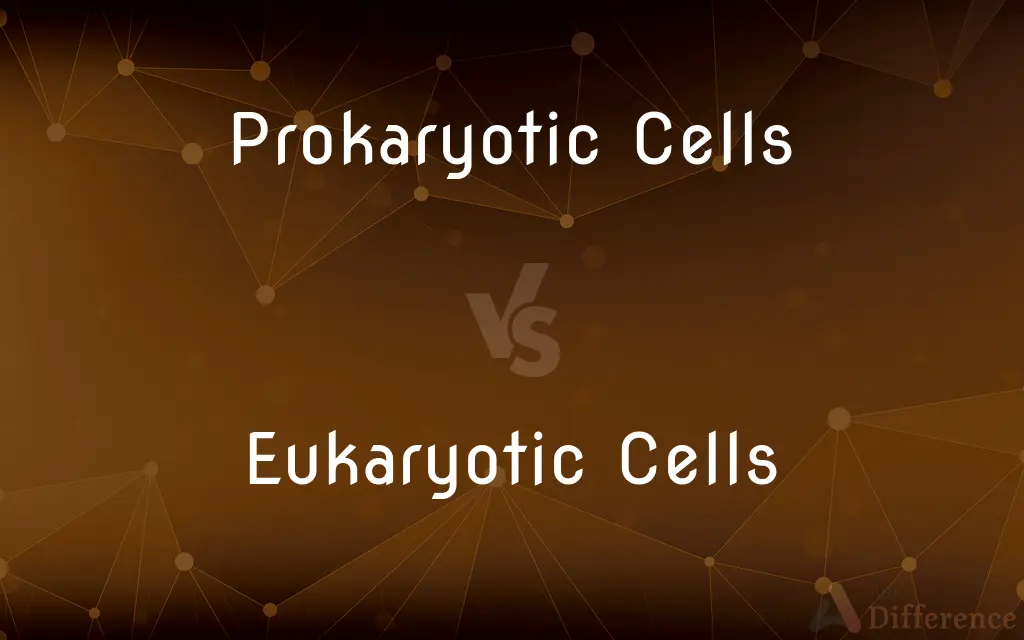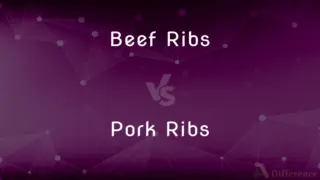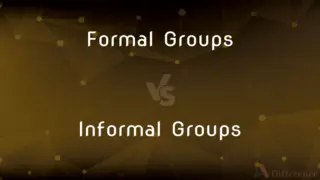Prokaryotic Cells vs. Eukaryotic Cells — What's the Difference?
By Tayyaba Rehman — Published on December 15, 2023
Prokaryotic Cells are Simple cells without a nucleus or organelles. Eukaryotic Cells are complex cells with a nucleus and organelles.

Difference Between Prokaryotic Cells and Eukaryotic Cells
Table of Contents
ADVERTISEMENT
Key Differences
Prokaryotic Cells are Characterized by their simplicity and lack of a nucleus. These cells do not have membrane-bound organelles. Eukaryotic Cells are complex, featuring a nucleus and various organelles enclosed within membranes.
Prokaryotic Cells are typically smaller in size, often found in bacteria and archaea. Eukaryotic Cells are generally larger and make up plants, animals, and fungi.
Prokaryotic Cells DNA is circular and floats freely in the cell cytoplasm. Eukaryotic Cells are Possess linear DNA housed within a nuclear envelope.
Prokaryotic Cells are reproduce mainly through binary fission, a simpler process. Eukaryotic Cells have complex reproductive processes, including mitosis and meiosis.
Comparison Chart
Nucleus
No true nucleus
True nucleus
ADVERTISEMENT
Organelles
No membrane-bound organelles
Membrane-bound organelles
Size
Typically smaller
Larger
DNA
Circular, free-floating
Linear, in nucleus
Reproduction
Binary fission
Mitosis, meiosis
Compare with Definitions
Prokaryotic Cells
Reproduce mainly through binary fission.
In prokaryotic cells, binary fission is a common form of reproduction.
Eukaryotic Cells
Reproduce through complex processes.
In eukaryotic cells, processes like mitosis are vital for growth.
Prokaryotic Cells
Do not have membrane-bound organelles.
Prokaryotic cells lack complex structures like mitochondria.
Eukaryotic Cells
Contain organelles like mitochondria.
Eukaryotic cells have specialized structures like chloroplasts.
Prokaryotic Cells
Typically smaller and less complex.
Prokaryotic cells, due to their small size, often go unnoticed.
Eukaryotic Cells
Have a true nucleus and organelles.
Human cells are eukaryotic cells, complex and organized.
Prokaryotic Cells
Contain circular DNA not enclosed in a nucleus.
Prokaryotic cells have circular DNA floating in the cytoplasm.
Eukaryotic Cells
Generally larger and more intricate.
Eukaryotic cells, due to their size, contain more cellular components.
Prokaryotic Cells
Lack a true nucleus and organelles.
Bacteria are prokaryotic cells, simple in structure.
Eukaryotic Cells
Possess linear DNA enclosed in a nuclear envelope.
Eukaryotic cells have their genetic material organized in a nucleus.
Common Curiosities
What’s unique about Eukaryotic Cells' DNA?
They have linear DNA housed within a nucleus.
What are Eukaryotic Cells?
Cells with a true nucleus and various organelles.
Are Prokaryotic Cells smaller?
Yes, they are typically smaller than eukaryotic cells.
How do Prokaryotic Cells reproduce?
Mainly through a process called binary fission.
Do Eukaryotic Cells have complex structures?
Yes, they have complex structures including various organelles.
What organisms have Prokaryotic Cells?
Bacteria and archaea are composed of prokaryotic cells.
Do Eukaryotic Cells have chloroplasts?
Yes, plant eukaryotic cells have chloroplasts for photosynthesis.
Are Eukaryotic Cells always larger?
They are generally larger, but size can vary.
What are Prokaryotic Cells?
Cells without a true nucleus or membrane-bound organelles.
Do Prokaryotic Cells have mitochondria?
No, they lack membrane-bound organelles like mitochondria.
Are Prokaryotic Cells less complex?
Yes, they are considered less complex due to their structure.
What organisms have Eukaryotic Cells?
Plants, animals, and fungi have eukaryotic cells.
Can Prokaryotic Cells be multicellular?
They are generally unicellular.
Do both cell types have ribosomes?
Yes, but their ribosomes are structurally different.
How do Eukaryotic Cells reproduce?
Through processes like mitosis and meiosis.
Share Your Discovery

Previous Comparison
Beef Ribs vs. Pork Ribs
Next Comparison
Formal Groups vs. Informal GroupsAuthor Spotlight
Written by
Tayyaba RehmanTayyaba Rehman is a distinguished writer, currently serving as a primary contributor to askdifference.com. As a researcher in semantics and etymology, Tayyaba's passion for the complexity of languages and their distinctions has found a perfect home on the platform. Tayyaba delves into the intricacies of language, distinguishing between commonly confused words and phrases, thereby providing clarity for readers worldwide.











































